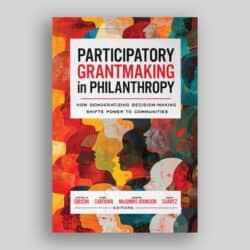Modernising Charity Law: Recent Developments And Future Directions
Edited by Myles McGregor-Lowndes & Kerry O’Halloran Edward Elgar, Cheltenham, u.k. & Northampton, ma, usa isbn 978-1-84980-250-5
Adam Aptowitzer
Those of us who work in the area of charit y law in Canada understand that the foundation of our work is the 1601 preamble to the Statute of Charitable Uses. But some forget that this same preamble has served as the fountainhead of charity law in essentially all of the Commonwealth countries. And so it should not be surprising that some of the problems Canada is struggling with today have been encountered in other jurisdictions. Nor should it be surprising that some of the solutions suggested here have been examined or tried in other Commonwealth countries.
For many of us, though, taking the time to gather the information that would allow one to understand is impractical. Fortunately, Modernising Charity Law, edited by Myles McGregor-Lowndes and Kerry O’Halloran, comes to our rescue. The book is a comparative law work that surveys developments in some of the other Commonwealth countries (and includes a short chapter on recent developments in China and Japan). The authors of the various essays are experienced academics or practitioners in their jurisdictions and provide a general outline to country-specific developments or, in some cases, a topic-specific approach to certain areas.
The essays themselves arose out of a conference held by the Australian Centre for Philanthropy and Nonprofit Studies in Brisbane, Australia, in April 2009. While many other papers were presented at the conference, the ones included in this book reflect the general themes that arose at the conference. This explains the prevalence of some topics and the absence of others (one might otherwise assume some issues faced in Canada simply do not exist elsewhere in the world).
The book begins with a survey of charity law reforms—or the lack thereof—since 2001 in selected Commonwealth countries and then segues into a discussion about the statutory definition of charity in Ireland, England, and Wales. While legislating a definition of charity in Canada is not a “hot” topic right now, it does tend to simmer in the background and so an understanding of the United Kingdom experience could help Canada put the issue in its proper context relative to the other challenges facing us here. As the requirement for public benefit is an integral part of UK charity legislation, these chapters have a significant focus on that test as well.
The book then focuses on the public-benefit issue but, rather than employing a survey approach, the essays concentrate on the UK. This is obviously welcome if the reader is particularly interested in that jurisdiction but is less instructive for those seeking a broader understanding of the issue. As if to anticipate this rather benign criticism, the editors include a short submission on developing charity law issues in China and Japan. Given the relative novelty of this area of the law in those two countries, this essay is of particular interest; however, realizing the likely insurmountable challenge in explaining the civil code, legal heritage, and politics of the area to an audience that likely has no expertise in these jurisdictions, it does not even try. While this is unfortunate, it does explain the brevity of the essay.
One area of greater applicability in Canada is a discussion of the English and Irish experiences in dealing with the situation, which arises when charities conduct business. These essays are well written and explore many of the same problems that we discuss here in Canada.
Finally, there are four essays of general application: a modern perspective on the advancement of religion, an examination of the relationship between government and charity, whether specific regulation of charities is even warranted, and a look at modernizing charity law jurisprudence. Of these, the essay regarding charity regulation is of special interest because of the author’s use of economic theory in making the arguments. That said, given the current climate in Canada, it is highly unlikely that any argument would be successful in arguing for less regulation rather than more in this country.
Perhaps one of the book’s greatest strengths—and, not coincidentally, its greatest weakness—is the tremendous detail found in most of the essays. This clearly strengthens the writing for those of us who lack enough of a sense of the issue to determine whether or not further research by the reader is warranted. However, the use of such detail comes at the expense of context. Many practitioners in Canada and elsewhere do not have the country-specific knowledge to understand the context that gives rise to various proposals or the manner in which such reforms are studied and implemented. So, at times, the reader is left at a loss in understanding the background to a particular approach.
Besides delivering a useful book of comparative law on a subject of very particular interest, the authors of the various essays, being experts in the area, have provided a wide array of sources, cases, and insights in the copious footnotes. One can easily see how another researcher or author on the topic could gain as much or more value from the footnotes as from the essays themselves. Unfortunately, while the footnoting is consistent, the lucidity of the writing is not, and there are times when the reading can be difficult, although these are relatively rare. Generally, the book is a relatively easy read given the academic nature of the topics.
The situation in Canada itself is mentioned only occasionally throughout the book, the only substantive exception being a short review by Laird Hunter and Bob Wyatt. (In fact, there are more Chinese statutes cited than Canadian ones.) There is an obvious reason for this, in that Canada has not made great strides in its reform of charity governance. In any case, such information would be redundant for the educated Canadian reader, and the information from other jurisdictions is likely more valuable overall.
One would hope that a better understanding of changes in other Commonwealth jurisdictions that have faced many of the same problems Canada is facing now would lead
us to regulation for the betterment of the sector in Canada. Of course, the difficulties facing Canada are unique in many ways, mostly because of our federal structure. This means that the lessons from around the world are not necessarily immediately applicable to Canada. Nevertheless, it seems that it is unnecessary for Canada to grope its way in the darkness when solutions have been tried and tested in other jurisdictions. With luck, this book will help those of us working in the area of charity policy to better see the forest rather than being lost in the trees.
Adam Aptowitzer practices charity and tax law with Drache Aptowitzer LLP. He is a member of both the bars of Alberta and Ontario, is a frequent speaker on charity law issues, and often writes on the topic of reform of Canadian charity law.


